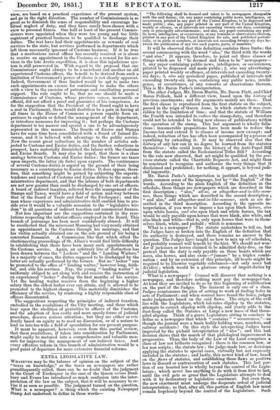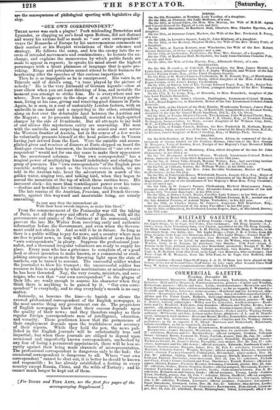EXTRA LEGISLATIVE LAW.
WHATEVER may be the balance of opinion on the subject of the "taxes on knowledge," as the taxes on newspapers are rather grandiloquently called, there can be no doubt that the judgment in the Court of Exchequer in the case of the Queen versus Brad- bury and Evans has introduced so much confusion into the inter- pretation of the law on the subject, that it will be necessary to re- vise it as soon as possible. The judgment turned on the question, What is a newspaper ? a thing which the existing Newspaper Stamp Ad undertook to define in these words- " The following shall be deemed and taken to be newspapers chargeable with the said duties ; viz, any paper containing public news, intelligence, or occurrences, printed in any part of the United Kingdom, to be dispersed and made public ; also, any paper printed in any part of the United Kingdom, weekly or oftener, or at intervals not exceeding twenty-six days, containing only or principally advertisements ; and also, any paper containing any pub- lic news, intelligence, or occurrences, or any remarks or observations thereon, printed in any part of the United Kingdom for sale and published periodi- cally, or in parts or numbers, at intervals not exceeding twenty-six days be- tween the publication of any two such papers, parts, or numbers."
It will be observed that this definition contains three limbs; the second commencing with the word "also," the third with the words "and also." It appears, therefore, to point out three classes of things which are to "be deemed and taken to be" newspapers- 1, any paper containing public news, intelligence, or occurrences, printed to be dispersed and made public ; 2, also any advertising'- paper printed weekly or oftener, at intervals not exceeding twenty- six days ; 3, also any periodical paper, published at intervals not exceeding twenty-six days, containing any public news, intelli- gence, or occurrences, or any remarks or observations thereon. This is Mr. Baron Parke's interpretation.
The other Judges, Mr. Baron Martin, Mr. Baron Platt, and Chief Baron Pollock, hold a different view, based upon the history of previous enactments ; and the arguments mainly are these. That the first clause is reproduced from the first statute on the subject, passed in the reign of Queen Anne, in which statute it was over- ridden by the limitation of time ; and that the statute of William the Fourth was intended to reduce the stamp-duty, and therefore could not be intended to bring new classes of publications within the operation of the stamp. This last argument is wholly falla- cious: innumerable propositions have been made to reduce the Income-tax and extend it to classes of income now exempt; and indeed, reduction of tax has often been accompanied by a process of' equalizing by extending it. It may be observed also that the history of any law can in no degree be learned from the statutes themselves : who could learn the history of the Anti-Papal Bill from the statute called the Ecclesiastical Titles Bill ? According to the rule now observed, that act might be qualified by the pre- vious statute called the Charitable Bequests Act, and might thus be construed to recognize and authorize the very things that it disclaimed and prohibited ; for nothing, it appears, is beyond judi- cial ingenuity. Mr. Baron Parke's interpretation is justified not only by the plain common sense of the language, but by "the English" Of the words. According to the plain English of the definition in the schedule, those things are newspapers which are described in the first description ; "also," all-so, or altogether-and-in-like-man- ner, those things which are described in the second description ; "and also," add altogether-and-in-like-manner, such as are de- scribed in the third description. According to the opposite in- terpretation, if you were to impose a tax upon black horses, also upon white horses, and also upon black and white horses, the tax would be only payable upon horses that were black, also white, and also black and white—that is, only upon horses that were in them- selves black, white, and piebald ; which is nonsense. What is a newspaper ? The statute undertakes to tell us, but the judges have so broken into the English of the definition that its authority is destroyed, and there remains no answer to the question. The Judges have taught us how to mix up all schedules, and probably counsel will benefit by the hint. We should not won- der if jackasses or horses claimed to be admitted duty-free, on the pretext that the duty is only payable on those beasts which are asses, also horses, and also oxen—"jumars" by a triplex combi- nation: and by an extension of this principle, all beasts might be required to be likewise vegetable substances—not only asses but dividivi ; which would be a glorious sweep of import-duties by judicial legislation. What is a newspaper? Counsel will discover that nothing is a newspaper, and therefore nothing must pay the newspaper-tax. At least they are invited to do so by this beginning of nullification on the part of the Judges. The incident is only one of a class. Judges countenance the plan of setting to work at finding holes in acts of Parliament ; and when counsel have found the holes, judges make judgments based on the said flaws. The origin of the evil lies with the Legislature which tolerates slipslop in the statutes, attempts to correct slipsiop with slipslop, and yearly adds to the dust-heap called the Statutes at Large a new mass of that three- piled slipslop. Think of a grave Legislature sitting in conclave to define as a newspaper that which " contains " "occurrences,"—as though the journal were a basin bodily holding wars, murders, and railway accidents ! On this style the interpreting Judges have improved by the piebald interpretation of "also"; and this last decision shows that the march of that philological improvement is progressive. Thus, the body of the Law of the Land comprises a class of law not hitherto recognized : there is the common law, or lex non seripta ; the statute law ; the judge-made law, or decisions applying the statutes to special cases, virtually but not expressly included in the statutes ; and lastly, this newer kind of law, based on the flaws of statutes, and establishing those flaws as positive laws in discord or contravention of such statutes. This last por- tion of our boasted law is wholly beyond the control of the Legis- lature ; which never has anything to do with it from first to last, until the evil gets so gross that the Legislature attempts to deal with it by declaratory or legislative enactment. But even then, the new enactment must undergo the desperate ordeal of judicial interpretation ; so that, after all, this portion of English law must remain hopelessly beyond the control of the Legislature. Such
are the consequences of philological sporting with legislative slip- slop.



































 Previous page
Previous page